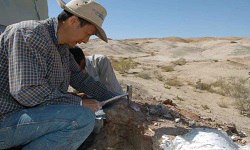Paleontology & Paleo-anthropology
It is a branch of archaeology with a human focus, which seeks to understand the early development of anatomically modern humans, a process known as hominization, through the reconstruction of evolutionary kinship lines within the family Hominidae, and working from biological evidence and cultural evidence. The field draws from and combines paleontology, biological anthropology, and cultural anthropology. As technologies and methods advance, genetics plays an ever-increasing role, in particular to examine and compare DNA structure as a vital tool of research of the evolutionary kinship lines of related species and genera. Paleontology is a rich field, imbued with a long and interesting past and an even more intriguing and hopeful future. Many people think paleontology is the study of fossils. Paleontology incorporates knowledge from biology, geology, ecology, anthropology, archaeology, and even computer science to understand the processes that have led to the origination and eventual destruction of the different types of organisms since life arose.
- Vertebrate and Invertebrate Paleontology
- Finite Element analysis in Paleontology
- Anthropology and fields of Paleoanthropology
- Anthropology and the human environment
Related Conference of Paleontology & Paleo-anthropology
Paleontology & Paleo-anthropology Conference Speakers
Recommended Sessions
- Archaeology
- Ecology & Environmental Engineering
- Economic Geology & Geochemistry
- Environmental Geology
- Environmental Sustainability
- Geology and Geophysics
- Geology in Civil Engineering
- Global Warming & Climate Change
- Groundwater Foundation & Hydrology
- Marine Geology & Oceanography
- Mining and Soil Exploration
- Natural Hazards & Disaster Management
- Oil and Gas Reservoir
- Paleontology & Paleo-anthropology
- Petroleum Geology
- Remote Sensing & GIS of Environment
- Sedimentology Geology & Stratigraphy
- Soil and Rock Mechanics
- Structural Geology
- Volcanology & Plate tectonics

